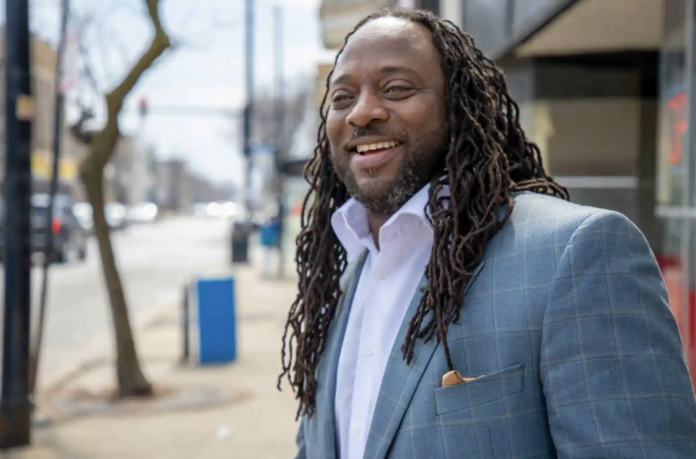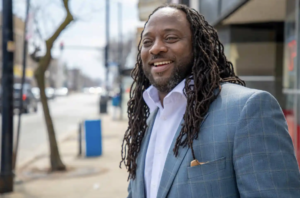

Steve Gates left for college at Jackson State in Mississippi sooner than he planned. He was on the run from gangbangers trying to track him down and kill him on Chicago’s South Side.
Gates was born to a seventeen-year-old mother in 1973. His father was rarely around. He grew up in Chicago’s Roseland neighborhood with his mother and grandmother. “My mother being a young single mother, my grandmother kind of stepped up. Not kind of. She raised me. It was different then. Roseland was much nicer, from what I remember. I saw it get bad. I don’t necessarily remember white flight, right, but it took place while we were there.”
In second grade at a Chicago public school the teacher called in his mother and said, “‘Hey, you know what, this guy…he’s reading! At a higher level. Get him out of here!’..My mom…I think at that time she was driving a school bus. But somehow she made a way to take me out of Chicago Public Schools and get me into Catholic school.”
Gates was young when he had to start trying to understand pointless fatal violence. “One of my cousins was killed when I was in grammar school. Maybe second or third grade. That was my first run-in with death and murder. I can remember that kind of shook me up. He was killed in the Henry Horner projects.” This was on the West Side, where Gates’ family had roots.
“I remember getting the news that he was shot in the back. My cousin on my Dad’s side. I didn’t know much about gangs or anything at that time. Maybe by third or fourth grade there was another murder. It was on my block. They shot a guy. Tied up and killed in the garage. I remember the teachers telling us about how bad gangs were, right after that murder. Not knowing that I lived right down the block from that…that kind of shaped and scared me. It gave me a disdain for those guys.”
The Catholic School Alternative: A Lifeline
Come ninth grade, the closest public school for Gates was Fenger. It was across a distinct boundary and unsafe for kids in his neighborhood because of gang rivalries. Years later Gates would do outreach work there. But as a student, he went several miles out of his way to the Catholic high school Saint Francis DeSalles.
“It was tough getting back and forth there, but I still wasn’t as at-risk as going in the community. High school was decent, good, but I struggled. I had to work to help my mom pay the tuition…I was going through stuff in the neighborhood…I had to grow up pretty quickly. I had a lot on me. But I’m grateful. I think it helped. I know it helped…I was set to go off to college…”
Gates had chosen Jackson State in Mississippi. A historically black university. “That’s where my roots are. Where my dad’s people were from, some of my mom’s people.”
But there was a big hitch near the end of high school. “I got arrested for an altercation with some guys. I had a beef, they pulled guns, we ended up whuppin’ ‘em. I ended up getting charged. Almost didn’t make it to college. Criminal damage to property, aggravated battery. I’m like, ‘these guys had guns, they antagonized us.’ But the judge is, ‘364 days in County Jail.’ And hit the gavel. And here come the sherrifs, and I’m like, ‘what?’ And then my aunt just wailed, ‘Wait. Wait a minute.’ So they were able to work it out with restitution…and probation, or something.”
Case closed? Hardly. Gates says a few days before he was going to head off for college in Mississippi, “I’m on the porch with my girlfriend, and some guys came by and just lit my house up, shot it up. And my mother didn’t have a car to drive me to school, so she had to borrow” one and “drove me that night. Dropped me at Jackson State in Jackson, Mississippi. And I was essentially homeless.
“My mom didn’t know much about housing or you know, the application fee so she was just reacting, doing the best that she could, you know, ‘if I don’t get you out of here you’re going to end up dead.’…It worked out. I ended up staying, I took the five-year plan to graduate.” Gates earned a bachelor’s degree in criminal justice.
Even then, violence was right in his face. “There was murder involved during grammar school. High school. When I got to college there were maybe three or four people that I was close to that ended up murdered. In Jackson.
“Not even counting the 90s in Chicago, and all my friends that got locked up, and were killed while I was away. It was, um, unnatural. I’ve been around a lot of death and you know, just some terrible shit. So. I ended up pledging a fraternity. When I called my mom I said, ‘hey, I need money so I can pay this registration.’ She was, ‘are you crazy? You think I’m paying you to join another gang?’
Crucial Turning Points
“She didn’t understand. And I got it. But, those milestones, those pivots, I know, saved my life. Her getting me out of here, me getting to college. I didn’t go to school trying to, with the idea of graduating, right? I went to flee. Just to get out of here. I tell the guys that. I tell the men that we work with now. I ran, from here. I didn’t go, I didn’t look, I didn’t have a visit. I was running. Relocating. And thank God it worked.”
After four years in a Catholic high school in Chicago, Steve Gates was college-ready. Despite the violence and drama in his life right up to the night his mother drove him south to Mississippi. Five years later as a graduate of Jackson State University back at home on Chicago’s South Side in Roseland, Gates found that it was still fierce on the streets.
“A lot of what happened in the 90s, right after crack hit, affected everybody I knew. I came back to Chicago around ‘95 and I put myself on house arrest. I stayed away. I was still on the block. Still at home, 113th between Wentworth and State. There were a bunch of new guys that I didn’t know, that were clinging to our area and there was still a huge conflict all around us.”
He first worked for his family’s trucking business. “My grandfather started that in a station wagon. My aunt was like, ‘hey, you didn’t have to go to college to throw boxes or deliver office supplies.’
Making Amends
“And as God would have it I met a woman, she worked for Hull House. Jane Adams Hull House. And I worked in their advocate program. She took a liking to me. She was like, ‘Steve, you really should work with these younger guys. You understand them.’ And I started at Hull House. I didn’t know how big or historic that was, when I got the job. But it was appealing, it was something that felt natural. I was trying to repent or make amends for some of the stuff that I did, or had been involved in. And it felt right.”
Some twenty-plus years after coming back home to Chicago from college, Gates would earn a master’s degree in social work from the University of Chicago, in 2018. A black man then in his forties, with dreadlocks, on the campus in Hyde Park. He remembers other students crossing the street to avoid him. He eventually started to wear U of C gear to make it clear he belonged. He chuckles talking about it, but there’s an edge to the memory.
Gates now works as an Innovation Manager for Chicago Beyond. They call themselves a social philanthropic partner. Since 2016 they’ve invested $30 million in fourteen Chicago-area organizations, leaders, and research. They aim to improve the lives of young people through programs in education, safety, community development, health and wellness, and more.
One of the Chicago Beyond partners that Gates works with closely is Chicago CRED. Headed by former CPS chief and ex-U.S. Education Secretary Arne Duncan, CRED focuses turnaround efforts on young men “at the highest risk of shooting or being shot.” There’s street-level outreach and then for the willing, trauma care, cognitive behavioral therapy, mentorship, work skills training, and transitional employment.
We’re talking outdoors and masked at one of CRED’s offices, on 95th Street near Chicago State University. To Steve Gates, improving public education in Chicago has to begin with correcting for the history of trauma, and bad public policy that has affected so many blacks.
“Ecological theory really fascinates me because if you look at Aid to Families with Dependent Children, that’s one policy. Like the War On Drugs. That’s another policy. The Three Strikes Law. Those are policies that played out in our communities that have direct effects…what you’re seeing now are residual effects of that policy, (and of) racism, fear, economics.”
He says, “you get a program like CRED that wants to provide a holistic wrap-around model because that’s how fucked up things are. You can’t just put a band-aid on it…It’s taking a stab at, not rehabilitation, but giving these men a fair first chance.”